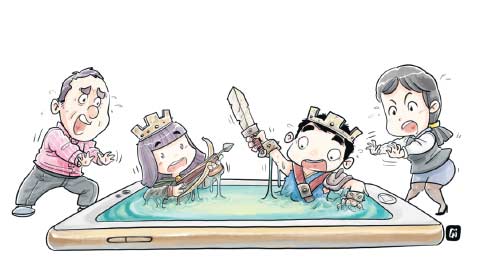Protecting juveniles from game addiction
China Daily by Qiao Xinsheng, July 19, 2017 Adjust font size:
 |
| Cai Ment/China Daily |
Article 19 of the General Rules of Civil Law says: "A minor attaining the age of 8 is a person with limited capacity for civil conduct (or limited disposing capacity), who shall be represented by his or her statutory agent in performing juridical acts or whose performance of juridical acts shall be consented to or ratified by his or her statutory agent, but may alone perform juridical acts which purely benefit the minor or are commensurate with his or her age and intelligence."
Disposing capacity means the mental ability or state of mind at which a person should possess to prepare a valid will. It is also known as testamentary capacity.
And Article 20 of the law says: "A minor under the age of 8 is a person without capacity for civil conduct, who shall be represented in performing civil juridical acts by his or her statutory agent."
According to the two articles, if a legal dispute were to arise over juveniles' addiction to online games, their statutory agent should perform civil juridical acts in their interests. And any contract a child becomes a part of or the payments he or she makes will be valid under the law only after his or her legal representative confirms it. Which means game providers cannot force a child's legal representative to take up the financial responsibility of the child's actions under any circumstances.
This also means, if children buy online game equipment using their parents' bankcards, game providers and software developers have the responsibility to check who exactly is making the payment, even if they have to use special technology for that.
But some game providers and software developers say it is difficult to determine a user's identity in the virtual world, and therefore they cannot be blamed for children's addiction to online games and the money they squander on them.
But a series of laws and regulations has made real-name registration mandatory. Besides, we can learn from the rules of countries that require game providers and software developers to design targeted protective measures for juveniles. For example, public libraries in developed economies such as the United States have installed special software to prevent children from indulging in online games or browsing porn websites. In fact, latest technologies can be employed to identify online game users, so game providers can use the accumulated data to protect children against addiction. To be honest, game providers such as Tencent have started using technical measures to curb children's gaming time.
Game providers and software developers cannot absolve themselves of the responsibility of employing effective technical measures to protect children against online game addiction. If they don't do so, they should be held responsible for the legal consequences.
I have two suggestions in this regard. First, the authorities should further strengthen the Cybersecurity Law. Only stricter regulations, some of which could be applied to specific cases, can prevent software developers and game providers from taking advantage of the legal loopholes to continue their business as usual.
Second, as the Standing Committee of the National People's Congress is reviewing the draft "Electronic Commerce Law", I suggest online games and game equipment be brought under the purview of the law, making it mandatory for software developers and game providers to closely inspect the users and purchasers and thus disallow juveniles to "trade" in virtual property. If the game developers and providers fail to do so, they should be held accountable for the consequences.
Only when strict rules on the legal responsibilities of game providers and software developers are formulated can they be made to adopt technical measures to protect children from addiction, which forces some of them to use their parents' bankcards to make payments.
It is equally important for parents to fulfill their duties toward their children. And parents should always remember what Article 34 of the General Rules of Civil Law says: "A guardian failing to perform the duty of guardianship or infringing upon the ward's lawful rights and interests shall assume legal liability."